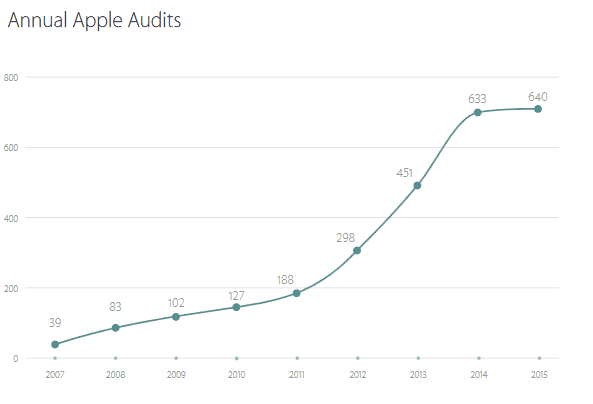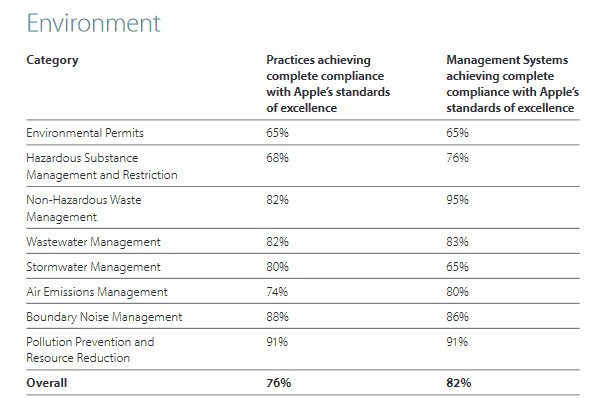Apple has once again released its Supplier Responsibility Progress Report, about two months later in the year than previous editions, but which as usual details the performance of the tech giant's supply chain against the standards it has set.
For the past several years, the report has been released in early February, but for unexplained reasons the 2016 report has just been released here in the first week of April.
This is the tenth such report, Apple says, but it was really five years ago, after Apple received a lot of criticism for how workers were being treated at some of its suppliers such as contract manufacturing giant Foxconn, that Apple really upped its compliance game and depth of the report.
While again full of interesting and useful information to understand what Apple is doing in terms of multi-tier supplier management, TheGreenSupplyChain.com's take is that the 2016 report is veering oto far towards hype and promotion, mostly as illustrated in numerous "case studies,' versus previous versions that were more focused on just the facts.
Early on, Apple COO Jeff Williams sets the tone, noting that "At Apple, we are deeply committed to making sure everyone in our supply chain is treated with the dignity and respect they deserve. Our team works hard to raise the bar every year to improve working conditions, provide educational opportunities, push for higher standards of living, and protect human rights."
Apple in fact was one of the first companies to in effect commit to being a "social" enterprise whose mission is in part to make the world a better place. It is here worth noting that one of the things Apple CEO Tim Cook most worried about when news of workers suicides and other employee issues at Foxconn and elsewhere in Apple's supply chain came to light was the reaction of employees to the news.
If a company is an Apple supplier, either directly or indirectly (i.e., a tier 1 supplier or further down the chain), it must comply with its supplier code of conduct and its supplier responsibility standard. Those documents contain more than 100 pages of comprehensive requirements in 20 key areas and some 500 different criteria, across labor and human rights, health and safety, environment, management systems, ethics and more.
A copy of those standards can be found here: Apple Supplier Responsibility Standards
Apple's extended suppliers must report on the various aspects of those standards, and are potentially subject to detailed audit by Apple and its agents. The report is thus then largely a summary of Apple supplier compliance with those standards, plus highlights of other programs Apple sponsors to help workers in its extended supply chain, improve the environment, etc.
Since the Foxconn reports, Apple has significantly increased the number of audits it has performed, as seen in the graphic below. The total has risen from 127 in 2010 to 640 last year, though the growth rate at last tapered off, with that total up just a bit from the 633 audits performed in 2014.

Of those 640 total audits, 21 were of the "surprise" type, where Apple auditors show up at a given supplier and demand immediate access to the facility and its employees.
Apple highlights some of the key results of its efforts from 2015, where for example it says "work-hour compliance among our suppliers has reached 97%, a number that is virtually unheard of in our industry."
It further notes that since 2008, more than 9.2 million workers have been trained on their rights, over 1.4 million people have participated in Apple educational programs, and more than $25.6 million in excessive recruitment fees have been repaid to foreign contract workers by suppliers as a result of our efforts.
The latter refers to nefarious programs where workers are forced to pay high fees to land a job at an Apple supplier factory in Asia, usually far from their native homes, to the point that they incur big debts they can almost never pay off, and in effect become a sort of wage slave as a result.
The 2016 report, for example, features one of the case studies referenced above, this one on a young woman who agreed to a recruitment fee to take a job at an Apple supplier in Taiwan that was more than her annual salary. Even though the fee was legal in Taiwan, it violated Apple standards, and when Apple somehow became aware of the situation, the supplier was obligated to reimburse the employee for the fee.
When an audit is performed, Apple says that if any violations are detected, "Noncompliant suppliers must submit a Corrective Action Plan within two weeks of the audit, outlining how they will fix the problems we found. Our team of verification specialists then works with suppliers, checking in at 30, 60, and 90-day intervals to make sure they're on track. Any delayed progress is escalated to senior management."
The standards are tough and to pass basically requires perfection. Apple notes, for example, that "We consider situational findings - for example, temporary blockage of an emergency exit by an easily removable item such as a box, or a cracked exit sign- to be instances of non-compliance despite being relatively easy to correct."
On labor and human rights, suppliers in aggregate achieved 84% compliance across a number of dimensions both in terms of "practices" and "management systems" (basically, are their governance processes in place to ensure compliance). That is roughly in line with last year's results.
Below is a chart showing compliance rates specific to environment areas. Here the rates of compliance are just a bit lower, with 76% on practices and 82% on management systems, but this is a pretty detailed report card, tracking compliance in eight different areas.
Apple Supplier Compliance to Environmental Standards in 2015

Some labor groups have questioned all this good news coming out of Apple. Last Fall, for example, US-based rights groups China Labor Watch issued a report alleging that "little progress" had been made in the conditions for workers making Apple's iPhone at some Shanghai locations of contract manufacturer Pegatron.
That report said that "Reality for workers at Pegatron is working 12-hour shifts, six days a week, forced to do overtime work and unpaid labor, with very short breaks for meals, facing hiring fees and unreasonable fines," among other sins.
Is that report accurate? Who knows. Clearly, Apple's code of standards and audit processes have not only had a major impact on its own supply chain, but on the approach of dozens of other companies as well.
The full report is available here: Apple 2016 Supplier Responsibility Progress Report
What do you think of the year's Apple supplier report? Let us know your thoughts at the Feedback button below.

|